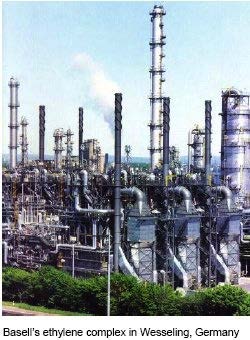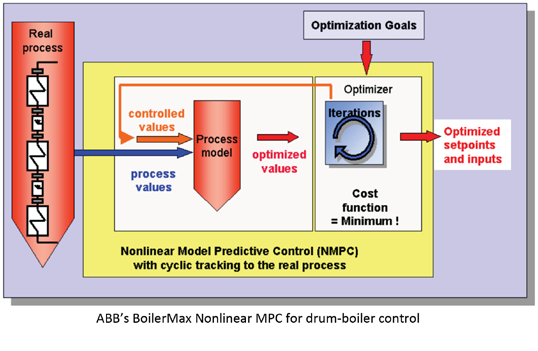Case 1 – Efficient and Economical Plant Management via Model Predictive Control
Submitting Institution
Imperial College LondonUnit of Assessment
Electrical and Electronic Engineering, Metallurgy and MaterialsSummary Impact Type
TechnologicalResearch Subject Area(s)
Mathematical Sciences: Applied Mathematics, Numerical and Computational Mathematics
Information and Computing Sciences: Computation Theory and Mathematics
Summary of the impact
Model Predictive Control (MPC) is a controller design methodology
involving on-line dynamic optimisation of a user-defined objective. The
research of Prof. D.Q. Mayne FRS and his colleagues at Imperial
College has resulted in the first MPC algorithms capable of dealing with
both linear and nonlinear systems and hard constraints on controls and
states, thus making MPC a viable technique for industrial applications.
His research in linear and nonlinear MPC has been exploited by
multinational companies such as Honeywell and ABB. Evidence of impact is
found in: 1) ethylene production by Basell Polyolefins GmbH resulting in
economic benefits in millions of dollars annually; 2) Sinopec's JinShan
power plant efficiency, reducing fuel consumptions of 500 tons of coal and
1,700 tons of coke per annum; 3) automotive powertrain design creating new
business for Honeywell (based on OnRAMP design suite); 4) ABB's cpmPlus
Expert Optimizer tools used for cement manufacturing, affecting companies
such as Untervaz (Switzerland), Lägerdorf (Germany) and Buzzi (Italy); 5)
ABB's BoilerMaz system for optimising boiler start-up mechanism resulting
in energy savings per start-up of around 15%.
Underpinning research
The combined use of optimal control and optimization methods conceptually
enables the optimized operation of complex processes. The most significant
contribution of Model Predictive Control (MPC) resides in the construction
of a feedback mechanism which approximately, and in real-time, optimizes
process operation, while satisfying operational constraints. These goals
cannot be achieved by any other control mechanisms. The underpinning
research in MPC at Imperial was conducted in the EEE Department by
Professor D.Q. Mayne. He has pioneered a number of research breakthroughs
in the analysis, design and development of both linear and nonlinear MPC,
which have resulted in him being awarded the prestigious "I EEE Control
Systems Award" (http://www.ieee.org/about/awards/bios/controlsys_recipients.html)
and the IFAC Quazza Medal (http://www.ifac-control.org/awards/major-medals).
The underpinning research in MPC by Mayne and his team are:
1. Receding horizon control [R1, R2] - In receding horizon
control the current control is determined by solving on-line a constrained
open-loop optimal control problem and applying this control over the
following sampling interval after which this procedure is repeated. It is
thus able to handle hard constraints on controls and states: this property
is one of its main advantages and the cornerstone of the stability
properties of MPC controlled nonlinear processes.
Since in large-scale applications on-line solution of nonlinear optimal
control problems may be impractical, Mayne provided a practical
alternative: sub-optimal MPC that ensures closed-loop stability even if
the optimal control problem is not solved exactly [R1]. Subsequently, the
ambitious task of evaluating systematically the stability and optimality
properties of MPC methods was presented in his 2000 paper [R2]. The paper
provides a rigorous analysis of solved problems and a lucid description of
open problems in MPC. As stated in [R2]:
``We distill ..... essential principles that ensure stability and use
these to present a concise characterization of most of the model
predictive controllers that have been proposed in the literature. In
some cases the finite horizon optimal control problem solved on-line is
exactly equivalent to the same problem with an infinite horizon; in
other cases it is equivalent to a modified infinite horizon optimal
control problem. In both situations, known advantages of infinite
horizon optimal control accrue.''
After its publication in 2000, this paper has become the most widely
cited MPC paper and was recognized in 2011 by the first IFAC High Impact
Paper Award (http://www.ifac-control.org/awards/major-medals).
2. Combined MPC and moving-horizon estimator [R3] - When not all
key variables can be measured — as is typical in industrial practice —
moving horizon estimators play the role of virtual sensors, which can be
combined, as shown in [R3], to yield an integrated control architecture.
In later work, Mayne developed a new moving horizon observer for nonlinear
systems that extends the memory of the observer in [R2]. Forward dynamic
programming was employed to effect this improvement.
3. Robust MPC for linear and nonlinear systems [R4, R5] - When
uncertainties and un-modelled nonlinearities are present — as typical in
industry — the standard implementation of MPC computes the control by
solving an open-loop optimal control problem that neglects the presence of
disturbances. [R4] and [R5] improve the standard MPC algorithm by the
addition of a local feedback loop that is relatively easily computed and
counteracts the disturbances thereby maintaining almost optimal
performance throughout the process operation.
References to the research
(* References that best indicate quality of underpinning research.)
R1.* Scokaert, P.O.M., Mayne, D.Q., Rawlings, J.B., "Suboptimal
model predictive control (feasibility implies stability)", IEEE
Transactions on Automatic Control, 44, 648-654, 1999,
DOI: 10.1109/9.751369.
R2.* Mayne, D.Q., Rawlings, J.B., Rao, C.V., Scokaert, P.O.M.
"Constrained model predictive control: Stability and optimality",
Automatica, 36, 789-814, 2000 (winner of the 1st IFAC High
Impact Paper Award, 2011 with over 3,500 citations), DOI:
10.1016/S0005-1098(99)00214-9.
R3.* Rao, C.V, Rawlings, J.B., Mayne, D.Q,, "Constrained State
Estimation for Nonlinear Constrained Discrete-Time Systems: Stability and
Moving Horizon Approximations ", IEEE Transactions on Automatic Control,
48 (2), 246-258, 2003, DOI:
10.1109/TAC.2002.808470.
R4. Mayne, D.Q., Rakovic, S.V., Findelsen, R., Allgöwer, F.,
"Robust output feedback model predictive control of constrained linear
systems", Automatica, 42, (7), 1217-1222, 2006, DOI: 10.1016/j.automatica.2006.03.005.
R5. Mayne, D.Q, Kerrigan, E.C., "Tube-based nonlinear model
predictive control", Proceedings of the 7th IFAC Symposium on
Nonlinear Control Systems, 110-115, 2007, DOI: 10.1002/rnc.1758
Details of the impact
Mayne's pioneering research in robust MPC for linear and nonlinear
systems made the MPC approach to controlling plants viable in practical,
industrial applications. The impact of his work on industry can be
quantified from two main vantage points: technical and economic. The
technology relying on linear and nonlinear MPC is used for improving
process performance, environmental impact and reliable operation.
The impact of Mayne's MPC research includes a number of industrial cases
of success. In the following five success stories in two multinational
companies, Honeywell and ABB, nonlinear MPC was the essential (or
fundamental) component. In addition, direct reference to the company
pioneering the introduction of MPC in the specific sector during the
current REF period is made.
• Honeywell — The impact of Mayne's research to Honeywell's
advanced control technology is evidenced by their testimony [E1]:
".... Professor Mayne has introduced several significant advances in
the area, especially in the extension of MPC to nonlinear systems."
They also stated that Professor Mayne's contributions in nonlinear MPC "...
has had the greatest impact on (our) industrial practice."
Honeywell specifically cited three areas of their operations in which
Mayne's MPC research work has been applied [E1]:
1) Ethylene production [E1, E2]: Ethylene is one of the
largest-volume industrial bulk commodity in the world. The majority of
ethylene is used in the production of ethylene oxide, ethylene dichloride,
ethyl-benzene, and a variety of plastics ranging from plastic food wrap to
impact-absorbing dashboards inside cars. Honeywell assisted Basell
Polyolefins GmbH, the world's largest producer of polypropylene (PP) and
advanced polyolefins products, in the implementation of nonlinear MPC
solutions to maximize profits from their ethylene plant. This
implementation has resulted, starting from 2008, in these key benefits: a)
substantial economic benefits, including ".. millions of dollars from
increase production annually" [E1]; b) improved quality control on
key units as a result of reduced control-variable standard deviations
(including a 52% reduction in standard deviation of top quality on the
PP-Splitter and 58% reduction in standard deviation of bottoms quality on
the PP-Splitter) [E2]; c) increased uptime: Basell has achieved an
Advanced Process Control online time in excess of 90% [E2].

2) Power plants [E1, E3]: Fuel costs, energy conversion
efficiency, and environmental impacts of fossil-fuelled plants have become
priorities in both developed and developing countries. Since 2008, the
Honeywell MPC tool has been particularly effective in the operation of
power plants [E1]. As a significant example, the deployment of a MPC-
based tool in the JinShan power plant (China) has enabled Sinopec to
increase the boiler efficiency by 0.5%, to increase the operating steam
temperature by 2.8°C and to improve stability of key combustion process
variables. In addition, the air pollutant emissions from the fuel and
limestone consumption have been decreased to comply with environmental
standards in the region. The reductions in coal and coke consumption are
500 tons and 1,700 tons per annum. [E3]
3) Automotive Powertrains [E4]: Automotive engines are highly
nonlinear plants with significant model uncertainty due to production
variability and ageing. At the same time the control must satisfy both
input and output constraints. Honeywell developed a fully functional
nonlinear MPC-based controller that can be deployed on an engine in 2-3
weeks of engine test time, and with superior performance, as contrasted
with the performance achieved via several months required for traditional
techniques [E4]. Based on this technology, they have established a new
business division based around their OnRAMP design suite for automotive
powertrains (http://www.honeywellonramp.com).
• ABB — ABB is another company where the successes of MPC for
industrial applications are amply demonstrated [E5]. Based on their
cpmPlus Expert Optimizer, an advanced process optimization product, they
have successfully used MPC in a number of manufacturing systems. Two
examples are cited [E5]:
4) Cement Manufacturing [E5, E6]: The cement industry of the 21st
century is confronted with disparate goals that at first glance seem to
conflict. For example, there is enormous pressure to increase profit and
margins, while at the same time there is considerable public interest in
the sustainable and environmentally friendly use of natural resources. In
other words, plant operators find themselves in a situation where they
need to react fast and optimally to continuously changing conditions while
still meeting various and probably conflicting objectives. MPC-based
feedback operates the plants to their optimal economic performance within
the technological, environmental, and contractual constraints. ABB has
installed MPC on-line optimizers in the Untervaz material blending plant
(Switzerland). Starting from 2008, the benefits achieved by the
installation are reduction by 20% of raw mix quality variability and
reduced kiln process variability. The nonlinear MPC-based optimizer has
been also installed in the Holcim's Lägerdorf precalciner for temperature
control (Germany), and Buzzi's Guidonis cements grinding system (Italy).
5) Coal-Fired Power Plants [E7]: Renewable energy sources have
pushed conventional power plants to be more flexible and efficient. This
has led to coal-fired power plants needing to have efficient boiler
start-up mechanisms. ABB has successfully developed, commercialised and
deployed numerous nonlinear model-predictive optimization solutions for
boiler start-up in power plants [E7]. The complex dynamics of the boiler
start-up mechanism are described by a nonlinear model subject to numerous
constraints on energy usage and thermal stress. The ABB solution based on
nonlinear MPC implementation has successfully shown to be able to solve
the boiler start-up problem nearly optimally. On average, the energy
savings per start-up are around 15%, while starting up is much faster than
with standard procedures [E5].

Sources to corroborate the impact
E1. Letter from Corporate Fellow, Honeywell Automation and Control
Solutions, Minneapolis, USA, stating the impact of Mayne's work in
nonlinear MPC on their process control business.
E2. Basell Optimize Ethylene Plant with Honeywell MPC and RTO",
https://www.honeywellprocess.com/library/marketing/case-studies/SuccessStory_Basell-"
Wesseling.pdf. Archived here
on 23/10/2013.
E3. "Sinopec Saves More than $1 Million in Energy Costs with Honeywell's
Advanced Energy Solutions", https://www.honeywellprocess.com/library/marketing/case-
studies/SuccessStory_Sinopec_AES.1.pdf.Archived here
on 23/10/2013.
E4. "Streamlining Powertrain Control Development: A Systematic Approach
to Model Based Control", https://www.honeywellonramp.com/TechnicalResources/Documents/2012
Workshop Madellbasierte Kalibriermethoden HONEYWELL v05.pdf.
Archived here
on 23/10/2013
E5. Letter from Head of ABB AG Corporate Research Centre Germany (on 5th
March 2013) on how nonlinear MPC has impacted on their business.
E6. "Advanced Control for the Cement Industry", The Impact of Control
Technology, 2011.
http://ieeecss.org/sites/ieeecss.org/files/documents/IoCT-Part2-05CementIndustry-LR.pdf
Archived here
on 23/10/2013.
E7. "Boiler control and optimization", FFWD 1/11, Power Generation
Special Issue, ABB Switzerland Ltd. pg 12. Archived here.
http://www02.abb.com/global/gbabb/gbabb905.nsf/bf177942f19f4a98c1257148003b7a0a/4951ad3b82277aaec12579210051feda/$FILE/FFWD+Power+Generation+Special+Issue.pdf